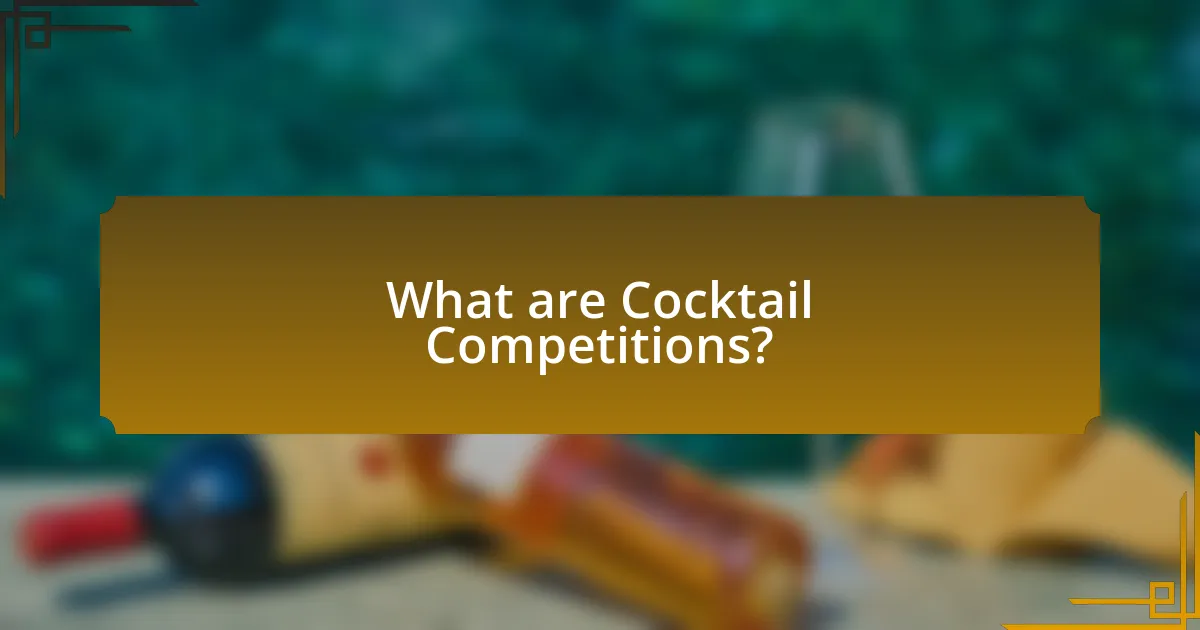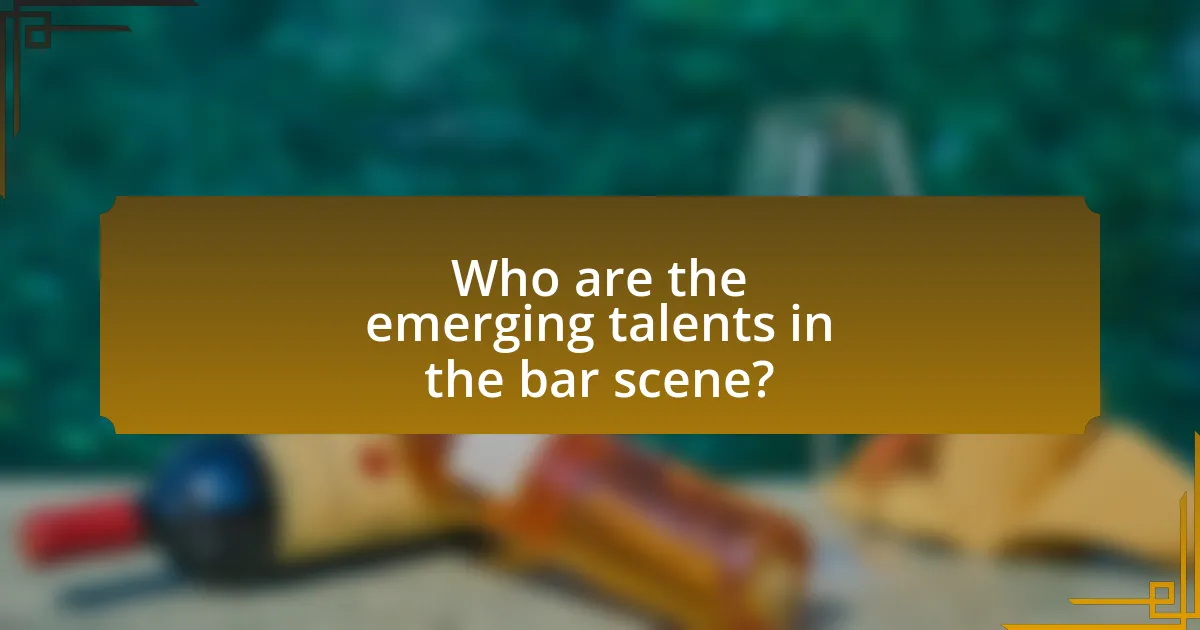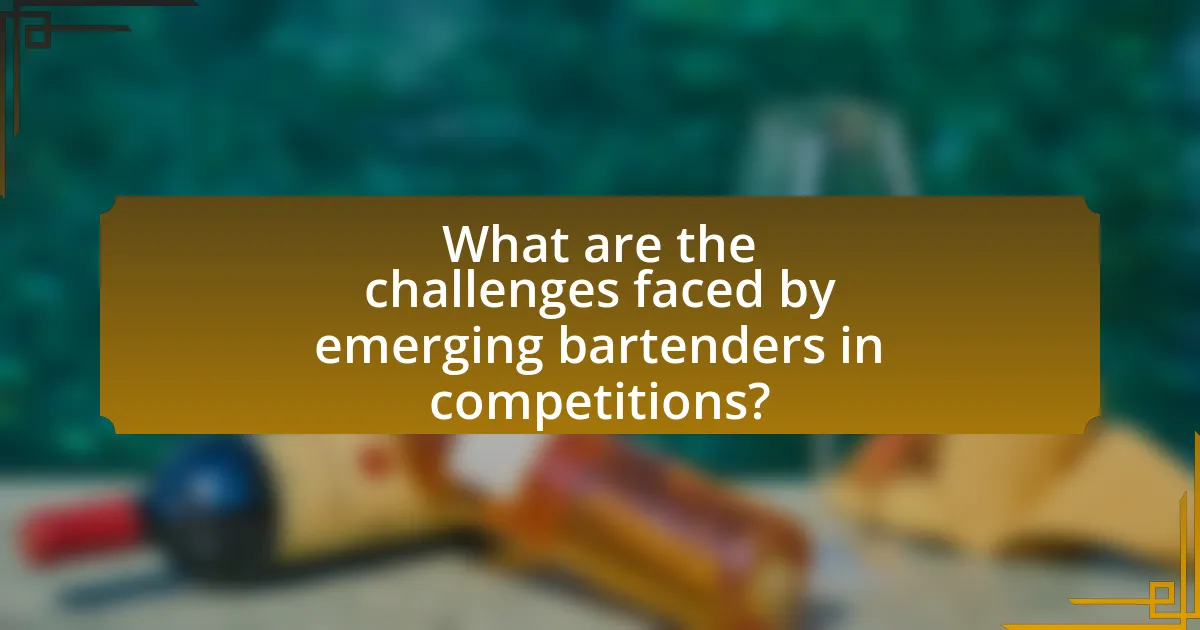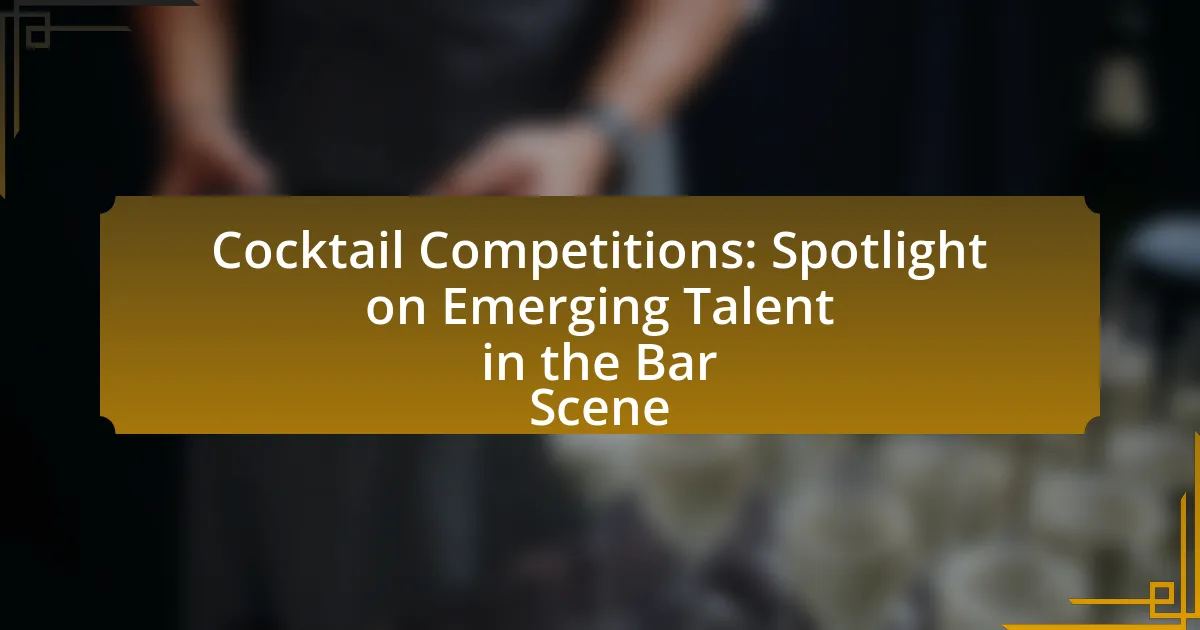Cocktail competitions are structured events where bartenders demonstrate their skills in crafting innovative cocktails, judged by industry experts based on creativity, presentation, and taste. These competitions, such as the World Class Bartender of the Year and Bacardi Legacy Global Cocktail Competition, play a crucial role in promoting emerging talent and fostering innovation within the bar scene. The article explores the functioning of these competitions, the key elements involved, the importance of mentorship, and the challenges faced by participants. It also highlights notable emerging talents in bartending and the impact of these competitions on trends in mixology, providing insights into how they shape the future of the industry.

What are Cocktail Competitions?
Cocktail competitions are events where bartenders showcase their skills in crafting cocktails, often competing for recognition, prizes, and opportunities within the industry. These competitions typically involve participants creating original drinks based on specific themes or ingredients, judged by a panel of experts who evaluate creativity, presentation, and taste. Notably, events like the World Class Bartender of the Year competition and the Bacardi Legacy Global Cocktail Competition highlight the significance of these contests in promoting emerging talent and innovation in the bar scene.
How do Cocktail Competitions function?
Cocktail competitions function as structured events where bartenders showcase their skills in crafting cocktails, judged by a panel based on criteria such as creativity, presentation, and taste. Participants typically prepare a set number of cocktails within a specified time frame, often using a theme or specific ingredients. These competitions serve as platforms for emerging talent in the bar scene, allowing bartenders to gain recognition and network within the industry. For instance, events like the World Class Bartender of the Year competition have been instrumental in elevating the profiles of many bartenders globally, highlighting their innovative approaches and techniques.
What are the key elements of a Cocktail Competition?
The key elements of a cocktail competition include the judging criteria, the skill level of participants, the creativity of cocktail recipes, and the presentation of drinks. Judging criteria typically assess taste, originality, and technique, ensuring that participants demonstrate a high level of bartending skill. The skill level of participants varies, often showcasing both emerging talent and seasoned professionals, which adds to the competition’s dynamic. Creativity is crucial, as competitors are encouraged to innovate with unique ingredients and flavor combinations. Lastly, the presentation of drinks plays a significant role, as visually appealing cocktails can enhance the overall experience and impression on judges and spectators.
How are judges selected for these competitions?
Judges for cocktail competitions are typically selected based on their expertise and experience in the beverage industry. These judges often include renowned bartenders, industry professionals, and educators who possess a deep understanding of cocktail crafting and trends. Their selection is usually facilitated by the competition organizers, who aim to ensure that the judging panel reflects a diverse range of skills and perspectives relevant to the competition’s focus. This approach helps maintain high standards and credibility in the evaluation process, as judges are expected to provide informed and fair assessments of the participants’ creations.
Why are Cocktail Competitions important for the bar scene?
Cocktail competitions are important for the bar scene because they showcase emerging talent and foster innovation within the industry. These events provide bartenders with a platform to demonstrate their skills, creativity, and unique cocktail recipes, which can elevate the overall quality of drinks served in bars. Additionally, competitions often attract industry professionals, media, and consumers, creating networking opportunities that can lead to career advancements and collaborations. For instance, events like the World Class Bartender of the Year competition have been instrumental in launching the careers of many renowned bartenders, highlighting the significance of these competitions in shaping the future of the bar scene.
What impact do they have on emerging talent?
Cocktail competitions significantly enhance emerging talent by providing a platform for exposure and skill development. These competitions allow novice bartenders to showcase their creativity and technical abilities in a competitive environment, which can lead to recognition within the industry. For instance, events like the World Class Bartender of the Year competition have launched the careers of many successful bartenders, offering them opportunities for mentorship, networking, and career advancement. Additionally, participation in these competitions often results in valuable feedback from industry experts, further refining the skills of emerging talent.
How do they influence trends in mixology?
Cocktail competitions influence trends in mixology by showcasing innovative techniques and unique flavor combinations that bartenders develop to stand out. These events often highlight emerging talent, pushing the boundaries of traditional cocktail recipes and encouraging creativity. For instance, the global rise of competitions like the World Class Bartender of the Year has led to increased interest in craft cocktails, artisanal ingredients, and sustainable practices within the industry. This competitive environment fosters a culture of experimentation, where bartenders share their creations through social media, further amplifying new trends and inspiring others in the mixology community.

Who are the emerging talents in the bar scene?
Emerging talents in the bar scene include bartenders such as Jesse Vida, who gained recognition for his innovative cocktail techniques, and Kelsey Ramage, known for her sustainable approach to mixology. These individuals have made significant impacts through their participation in prestigious cocktail competitions, showcasing their skills and creativity. For instance, Jesse Vida won the 2022 United States Bartenders’ Guild National Cocktail Competition, highlighting his expertise and influence in the industry. Kelsey Ramage, co-founder of the acclaimed bar “The Cocktail Cartel,” has been celebrated for her commitment to eco-friendly practices, earning her accolades in various competitions. Their achievements reflect a growing trend of skilled bartenders who are redefining the craft and pushing the boundaries of cocktail culture.
What characteristics define emerging talent in bartending?
Emerging talent in bartending is defined by creativity, technical skill, and a strong understanding of flavor profiles. Creativity allows bartenders to innovate and craft unique cocktails that stand out in competitions, while technical skill ensures they can execute complex techniques with precision. A strong understanding of flavor profiles enables them to balance ingredients effectively, enhancing the overall drinking experience. These characteristics are essential as they contribute to a bartender’s ability to impress judges and patrons alike, ultimately leading to recognition in the competitive bar scene.
How do these talents differentiate themselves from established bartenders?
Emerging talents differentiate themselves from established bartenders through innovative techniques, unique flavor combinations, and a strong emphasis on presentation. These new bartenders often experiment with molecular gastronomy and artisanal ingredients, setting their cocktails apart from traditional offerings. For instance, many emerging talents participate in cocktail competitions where they showcase their creativity and technical skills, often winning accolades that highlight their distinct approaches. This competitive environment fosters a culture of innovation, allowing them to gain recognition and establish a unique identity in the bar scene, contrasting with the more conventional methods typically employed by established bartenders.
What skills are essential for success in cocktail competitions?
Essential skills for success in cocktail competitions include creativity, technical proficiency, and presentation skills. Creativity allows competitors to develop unique and innovative cocktail recipes that stand out to judges. Technical proficiency encompasses knowledge of mixology techniques, ingredient selection, and the ability to execute complex drink preparations accurately and efficiently. Presentation skills are crucial as they involve not only the visual appeal of the cocktail but also the ability to engage and communicate effectively with the judges about the drink’s concept and flavor profile. Competitors who excel in these areas are more likely to impress judges and achieve success in competitions.
How do Cocktail Competitions help in discovering new talent?
Cocktail competitions play a crucial role in discovering new talent by providing a platform for bartenders to showcase their skills and creativity. These events attract participants from diverse backgrounds, allowing judges and industry professionals to identify promising individuals based on their performance, innovation, and ability to engage with the audience. For instance, competitions like the World Class Bartender of the Year have launched the careers of many successful bartenders, highlighting their unique styles and techniques to a global audience. This exposure not only helps emerging talent gain recognition but also connects them with potential employers and mentors in the industry, fostering their professional growth.
What platforms do these competitions provide for participants?
Cocktail competitions provide platforms such as live events, online voting systems, and social media channels for participants. These platforms enable bartenders to showcase their skills, gain visibility, and connect with industry professionals. Live events allow for direct interaction with judges and audiences, while online voting systems facilitate broader participation and engagement. Social media channels serve as a means for participants to share their creations and experiences, further enhancing their reach within the bar scene.
How do competitions foster networking opportunities?
Competitions foster networking opportunities by bringing together individuals from diverse backgrounds within the industry, such as bartenders, judges, and sponsors. These events create a platform for participants to connect, share experiences, and build relationships that can lead to future collaborations. For instance, a study by the National Restaurant Association highlights that 70% of industry professionals credit competitions as a key factor in expanding their professional networks. This interaction not only enhances personal connections but also opens doors to mentorship and career advancement within the bar scene.

What are the challenges faced by emerging bartenders in competitions?
Emerging bartenders face several challenges in competitions, including limited experience, high-pressure environments, and intense competition from seasoned professionals. Limited experience often results in a lack of familiarity with advanced techniques and presentation skills, which are crucial for success in high-stakes settings. The high-pressure environment can lead to performance anxiety, affecting their ability to execute complex recipes or engage with judges effectively. Additionally, intense competition from established bartenders can overshadow emerging talent, making it difficult for newcomers to gain recognition and showcase their skills. These factors collectively hinder their ability to perform at their best and achieve desired outcomes in competitions.
What common obstacles do participants encounter?
Participants in cocktail competitions commonly encounter obstacles such as intense competition, time constraints, and limited resources. Intense competition arises from a high number of skilled bartenders vying for recognition, which can create pressure and anxiety. Time constraints often challenge participants as they must prepare and present their cocktails within strict time limits, impacting their ability to showcase creativity. Limited resources, including access to specific ingredients or equipment, can hinder participants’ ability to execute their vision effectively. These obstacles can significantly affect performance and outcomes in competitions.
How can emerging bartenders overcome these challenges?
Emerging bartenders can overcome challenges by actively seeking mentorship and participating in workshops to enhance their skills. Mentorship provides guidance from experienced professionals, which can help new bartenders navigate industry complexities and improve their craft. Workshops often focus on specific techniques, trends, and innovations in mixology, equipping bartenders with the knowledge needed to excel in competitions. According to a study by the United States Bartenders’ Guild, mentorship programs significantly increase the success rate of emerging bartenders in competitions, demonstrating the effectiveness of these strategies in overcoming industry challenges.
What resources are available to support their journey?
Resources available to support emerging talent in cocktail competitions include mentorship programs, industry workshops, and online platforms for skill development. Mentorship programs connect novice bartenders with experienced professionals, providing guidance and insights into the competitive landscape. Industry workshops often focus on specific skills such as mixology techniques, flavor pairing, and presentation, enhancing participants’ abilities. Online platforms, such as educational websites and social media groups, offer tutorials, networking opportunities, and community support, facilitating continuous learning and engagement within the bar scene. These resources collectively foster growth and development for individuals pursuing careers in cocktail competitions.
How can emerging talents prepare for Cocktail Competitions?
Emerging talents can prepare for cocktail competitions by mastering essential bartending skills, understanding flavor profiles, and practicing signature cocktails. Mastery of techniques such as shaking, stirring, and garnishing is crucial, as competitions often assess technical proficiency. Understanding flavor profiles allows competitors to create balanced and innovative drinks, which is vital for impressing judges. Additionally, practicing signature cocktails helps talents refine their personal style and presentation, which can set them apart in a competitive environment. Competitors should also study past competition winners to identify successful strategies and trends, enhancing their preparation and performance.
What training or practice methods are most effective?
The most effective training and practice methods for cocktail competitions include structured mentorship, hands-on experience, and focused skill development. Structured mentorship allows emerging bartenders to learn from experienced professionals, providing guidance on techniques and industry standards. Hands-on experience in real bar environments enables participants to apply their skills in high-pressure situations, enhancing their adaptability and creativity. Focused skill development, such as mastering specific techniques like flair bartending or flavor pairing, ensures that competitors can showcase their unique abilities effectively. Research indicates that bartenders who engage in these methods tend to perform better in competitions, as they develop both technical skills and confidence in their craft.
How important is mentorship in preparing for competitions?
Mentorship is crucial in preparing for competitions, particularly in the cocktail scene. Experienced mentors provide guidance on techniques, flavor profiles, and presentation skills that are essential for success. Research indicates that 70% of mentees report improved performance and confidence in competitive settings due to mentorship. This support not only enhances technical skills but also fosters creativity and innovation, which are vital in cocktail competitions.
What are the best practices for succeeding in Cocktail Competitions?
To succeed in cocktail competitions, participants should focus on creativity, technique, and presentation. Creativity involves developing unique flavor combinations and innovative cocktail concepts that stand out to judges. Technique is crucial; mastering essential bartending skills, such as shaking, stirring, and garnishing, ensures that the cocktail is executed flawlessly. Presentation plays a significant role as well; visually appealing cocktails can enhance the overall impression and score.
Additionally, understanding the competition’s rules and criteria is vital for tailoring the approach to meet specific judging standards. Engaging with the audience and judges through storytelling about the cocktail can also create a memorable experience. Competitors should practice extensively to refine their skills and gain confidence, as preparation directly correlates with performance quality.
How can participants effectively showcase their creativity?
Participants can effectively showcase their creativity by developing unique cocktail recipes that highlight innovative flavor combinations and presentation techniques. By experimenting with unconventional ingredients, such as exotic fruits or artisanal spirits, participants can create distinctive drinks that stand out. Additionally, incorporating visually appealing garnishes and serving methods enhances the overall experience, making the cocktails memorable. Research indicates that originality in cocktail creation can significantly impact judges’ perceptions, as seen in competitions where unique presentations and flavors often lead to higher scores.
What strategies can help in managing competition stress?
Effective strategies for managing competition stress include preparation, mindfulness techniques, and physical exercise. Preparation involves thorough practice and familiarization with the competition format, which can enhance confidence and reduce anxiety. Mindfulness techniques, such as deep breathing and visualization, help in maintaining focus and calming nerves during high-pressure situations. Physical exercise, known to release endorphins, can alleviate stress and improve overall mood, making it easier to handle competition-related pressures. Research indicates that athletes who engage in regular physical activity report lower levels of stress and anxiety, supporting the effectiveness of these strategies in competitive environments.
